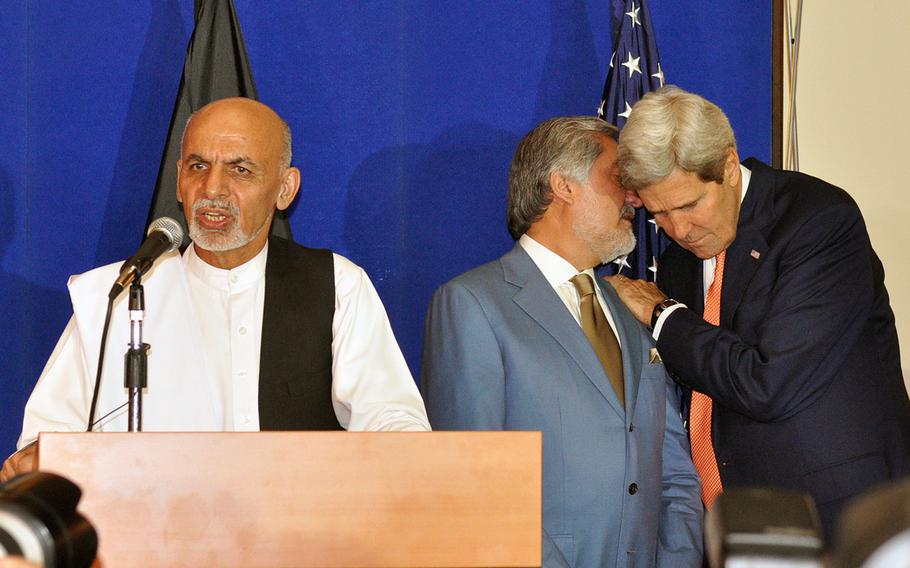
Afghan presidential candidate Ashraf Ghani speaks during a news conference on Friday, Aug. 8, 2014, in Kabul as rival candidate Abdullah Abdullah, center, talks to Secretary of State John Kerry. (Steven Beardsley/Stars and Stripes)
KABUL, Afghanistan — A committee formed by Afghanistan’s rival presidential candidates began discussions on a unity government here Tuesday, as NATO’s secretary-general urged a speedy resolution to the country’s election crisis.
The committee is part of a joint agreement signed by candidates Ashraf Ghani Ahmadzai and Abdullah Abdullah last week during a visit by Secretary of State John Kerry. It will flesh out the scope of several new government positions established in the agreement, including a chief executive and an opposition leader. It also will determine the opposition’s role in the government. The committee was scheduled to meet for the first time on Tuesday afternoon.
The talks begin as a massive audit of the June 14 runoff between the two men continues, with the goal of announcing a winner by month’s end in time for the president-elect to attend a NATO summit in Wales the first week of September.
The pressure on Afghanistan to reach a resolution was reinforced again Monday, when NATO Secretary-General Anders Fogh Rasmussen told the Reuters news agency that NATO needed an agreement with Afghanistan signed as soon as possible if the alliance is to keep a training and advising force in the country past 2014, when its combat mission ends.
“Time is now of the essence and that is why we urge the Afghans to find a rapid conclusion of the presidential election process, and we urge the new president to sign the legal arrangements as soon as possible after inauguration,” Rasmussen told Reuters.
Both candidates have said they will sign security agreements with the U.S. and NATO laying out the terms for foreign troops to stay.
But the slow pace of election auditing has raised doubts that it will determine a winner in time for the NATO summit. As of Sunday evening, 26 percent of more than nearly 23,000 ballot boxes had been reviewed, according to the Afghan Independent Election Commission, which is overseeing the audit. The IEC increased the number of auditing teams by a third on Tuesday in hopes of speeding up the process.
The audit, part of an initial deal brokered by Kerry, began July 17 after accusations by Abdullah that fraud was behind Ghani’s win in the second round of voting. Abdullah led after the first round, but not by enough votes to avoid a runoff.
Creating the new government structure, referred to in the recent Kerry agreement as a “national unity government,” poses new challenges for the candidates. A chief executive position would be established by presidential decree function as a prime minister, until that office could be added to Afghanistan’s constitution. The chief executive position would be filled with a nominee chosen by the losing candidate and agreed upon by the president.
The new government will also include the position of “opposition leader,” to be filled by the losing candidate and work with the president in staffing key government positions “according to the principle of achieving parity,” the agreement states.
Some observers and media have called the new structure “power-sharing,” a term Ghani took issue with in a recent TV interview in Kabul, noting it was never used in the agreement. Those comments, in turn, rankled the Abdullah camp, which points to the word “parity.”
“I hope the commission comes out with a single interpretation of the text and we stop playing with words and move forward,” said an Abdullah campaign spokesman, Mujeeb-ur-Rahman Rahimi.
The candidates also disagree on the timeline for finalizing the new government structure. Abdullah’s campaign believes it should be finished before election results are released, while Ghani’s camp said he has already promised to abide by the Kerry-brokered deal, so the timing is not an issue.
“I don’t think Dr. Abdullah’s camp should be worried about if that agreement comes before or after (election results),” said Ghani spokesman Hamidullah Farooqi. “I don’t think it’s going to make any difference. Because Dr. Ghani knows he needs his opposition support and their views and their capacity to be used for the serving of the nation.”
Spokesmen for both campaigns said international pressure mattered less than the opinions of Afghans.
“Not only from the U.S. and NATO, but there is a lot of pressure from the Afghan people,” Farooqi said.
Zubair Babakarkhail contributed to this report.
bearsdley.steven@stripes.com Twitter: @sjbeardsley